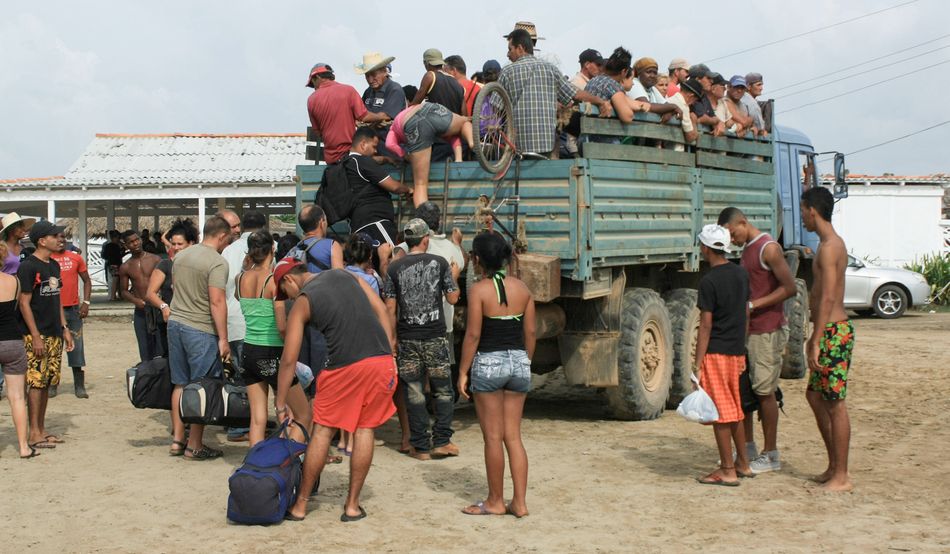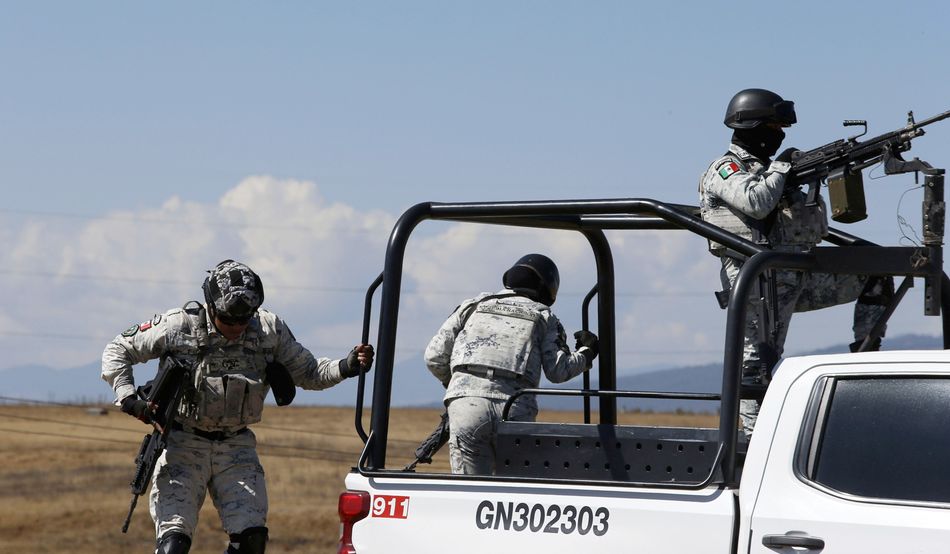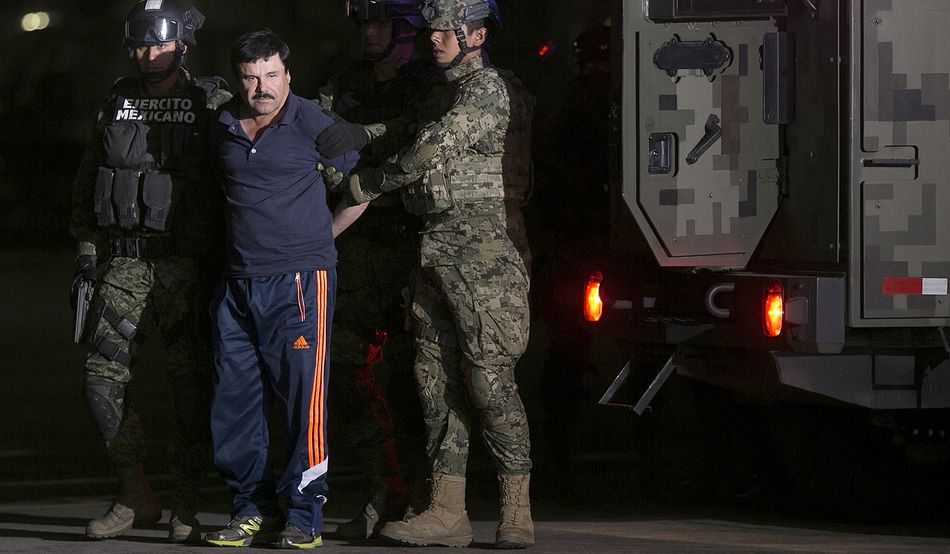Jasmin, who is 31 and from Honduras, sits on the floor of a crowded migrant shelter watching her three-year-old daughter, Brindi, eat instant noodles out of a plastic pot. The heat in the city of Tapachula, southern Mexico, is oppressive, and the girl’s white cotton dress is dirty with stains. Jasmin is weary. After leaving Honduras and crossing Guatemala into Mexico, she and Brindi were stopped by four young men. “They had pistols. Ugly ones,” Jasmin tells me, wrinkling her nose. Most likely working for one of Mexico’s powerful drug cartels, the men took Jasmin and her daughter to a shack. They kept them there until relatives in Honduras agreed to pay 24,000 Mexican pesos (about £930) for their release.
After being freed about a month ago, the two came here, to the shelter, Jasmin says. Going home, where the Barrio 18 street gang “want me dead”—a story she doesn’t want to elaborate on—wasn’t an option.
Weeks earlier, Jasmin had crossed the murky green waters of the Suchiate River on an improvised raft. About a 40-minute drive from the city of Tapachula, the river marks the border between Guatemala and Mexico. It also marks the spot where the security headaches begin for Mexico’s new president, Claudia Sheinbaum, who won a landslide victory in June’s presidential elections.
On a recent morning in September, dozens of rafts, made of wooden slats mounted on two enormous inflated black rubber doughnuts, moved slowly and constantly between the banks of the river. These rafts carried everything from boxes of beer, rice, fruit and vegetables to smuggled drugs, guns and humans. They were in full view of the bridge above, the official entry point into Mexico manned by the National Guard and immigration officials.
Many of the people crossing the Suchiate are, like Jasmin, migrants from dozens of troubled countries around the world, including China, Syria and Afghanistan. These migrants are on their way to Mexico’s border with the United States in search of the Holy Grail: asylum. The drugs—cocaine from Colombia, Peru and Bolivia, as well as fentanyl and methamphetamine precursors from Guatemala and Honduras that the cartels use to make synthetic drugs—are headed for the US, Europe and beyond. The guns, purchased in Guatemala, are trafficked into Mexico, helping arm the criminal groups who shepherd drugs and migrants around the country and the Americas at great profit.
These dynamics are at the root of what has turned Mexico into one of the region’s perennially violent nations. Their impact on public security, economic growth and the state’s limited capacity to fight crime puts them at the top of Sheinbaum’s to-do list.
Tapachula and the Suchiate River are at the southern end of Chiapas, one of Mexico’s poorest states. Yet up until recently it had been largely spared the drug-related violence detonated elsewhere in the country by a government crackdown on organised crime that began in 2006. Since then, there have been more than 430,000 killings across Mexico related to the illegal drug trade. More than 100,000 people have been reported missing.
But murders, displacements and disappearances in Chiapas began to rise a couple of years ago. Fighting broke out between two of the country’s leading criminal syndicates—the Sinaloa cartel and the Jalisco New Generation cartel—over territory and trafficking routes on the border with Guatemala, which is more than 336 miles long. Much like Mexico’s northern frontier with the US, the southern border is a major avenue for transnational trafficking and smuggling. Yet there is no wall here; the international line is completely porous. Now the de facto sheriffs are the cartels and armed criminal groups—not the Mexican government.
Mexicans are as likely as migrants to get caught in the crosshairs of crime wars
For Chiapas, the rising stakes came, in part, from a surge in migrants crossing into Mexico headed for the US. The cartels wanted a bigger share of the growing revenues. “Suddenly organised crime realised the business of trafficking people might be better than drugs as a business plan for them, and especially in the last two years given the number of people actually crossing. It’s unprecedented,” Ernesto Lorda, the Norwegian Refugee Council’s director for Central America and Mexico, tells me.
Migrants like Jasmin pay criminal organisations thousands of dollars to move them to the US-Mexico border safely, helping them avoid the kind of ordeal she went through. When Jasmin crossed into Mexico without a local smuggler to guide and protect her, she and her daughter were totally exposed to criminal organisations. Karin, a 33-year-old Colombian woman from Cali migrating with her husband and four children, tells me she had been advised by other migrants and by nonprofit workers not to leave the town square alone after crossing over the Suchiate River that day.
“They told us we could be kidnapped, tortured or raped [by organised criminal groups],” says Karin, sitting cross-legged in the shade of a central gazebo. She had made the treacherous journey with more than 12 others. Officials from Mexico’s immigration agency (Instituto Nacional de Migración, or INM) had asked them for a thousand pesos (about £40) a person to take the bus from the banks of the river to Tapachula, the nearest major city, she tells me, a journey that takes around 50 minutes. Karin’s family didn’t have the money, so here she is, stuck in Tapachula.
Mexicans are as likely as migrants to get caught in the crosshairs of the crime wars. One day in July, residents of Amatenango de la Frontera, just over 60 miles northeast of Tapachula, heard gunshots ring out as rival criminal groups exchanged fire. The residents fled to the nearest town, which was over the border in Guatemala. Some 600 people were displaced, according to media reports. “I left my home because of the shooting, and out of fear,” a local farmer told the Associated Press, requesting anonymity. “The cartels kill even the innocent.”
A month before that, around 5,000 people were forced out of the town of Tila, 185 miles north of the border. When I ask local journalists and residents if it is safe to take the road from Tapachula up towards other border towns and eventually Tila, the answer is a solid no. The green, fertile land is lush with forested mountains and deep jungle, the tropical heat a challenge even for the most tolerant locals. The highway that runs close to the frontier with Guatemala is lined with checkpoints, we are told. If “they” see a foreign journalist, the best that can happen is that we would be turned back, but it’s more likely the suspected journalist would be held and questioned by cartel foot soldiers.
The number of people reported missing in Chiapas has tripled since 2019. More than 12,700 people have been displaced in 2024 alone, according to official figures analysed by the thinktank InSight Crime, a sharp rise from the 4,562 recorded during 2023.
Over the phone, I speak to Carlos Quiroz, a former resident of Tila. He and his family had ended up in the neighbouring town of Yajalón after cartel henchmen set fire to his house, with his family inside it. Conflict in the town had been brewing for generations over land rights and ownership, and when some members of the community took control of Tila, they allied with the Jalisco New Generation cartel to start extorting and kidnapping for profit, Quiroz says. “This whole area is controlled by the narcos. They handle all the checkpoints and they kill journalists, and people who come to investigate… and the government does nothing about it.”
Even the Catholic Church of San Cristóbal de las Casas, a historic city popular with tourists, stepped in to plead with the government for help. “Our towns continue to suffer. We are in the midst of a war with no end,” the church said in a statement in May. “[We are] cannon fodder and human shields, many of our communities have been abandoned because of threats, murders and abductions, they have sown fear and terror and taken control of our lands and territory, and the state has done nothing to protect our lives or provide security.”
But speaking out has consequences. In late October, Father Marcelo Pérez, a prominent local voice against drug trafficking in Chiapas, was killed by two armed men on a motorbike in San Cristóbal de las Casas. He had been leaving church after celebrating Sunday mass.
In July 2023, criminal groups kidnapped 16 government officials in Ocozocoautla de Espinosa, northwestern Chiapas. In the town, colloquially known as Coita, a woman told the Spanish newspaper El País: “There are almost always confrontations. At the entrances [of the town] are the large houses of the drug traffickers… the entire area is militarised, but the National Guard does nothing.”
Yet the National Guard, which is now controlled by Mexico’s military, is the best defence that the government has against the growing power of the cartels, which at times have outnumbered and outgunned the armed forces with military-grade weaponry. In an incident that made headlines around the world, Mexico’s army was forced to release Ovidio Guzmán, one of the sons of the former Sinaloa cartel boss Joaquín “El Chapo” Guzmán, when he was captured in Culiacán, Sinaloa, in October 2019. The armed forces found themselves outnumbered by cartel henchmen in the organisation’s eponymous birthplace. Ovidio was later recaptured and extradited to the US in 2023 following a violent gun battle between the government and Guzmán’s organisation.
Mexico’s first female president has inherited a tremendous challenge from her predecessor and political godfather, Andrés Manuel López Obrador (known locally as AMLO), of the Morena political party. AMLO is widely considered to have neglected the fight against crime during his six-year administration. The travails of Chiapas are a microcosm of what is happening across the country.
Public security is weak to non-existent in some parts of Mexico as shootouts, mass killings and brutal displays of violence linked to organised crime remain commonplace. Criminal groups are the de facto authority in some areas, terrorising, recruiting, killing and displacing locals. The United States Northern Command estimates that Mexican cartels now control 30 to 35 per cent of the country. Drug trafficking has become an aspirational way of life for many young people, and the cartels boast of their weaponry and brutality across Instagram and TikTok—all this despite nearly two decades of US-funded anti-narcotics intervention in the country, and the pursuit of the kingpin strategy that put El Chapo and other top narco brass and corrupt officials behind bars.
Sheinbaum will struggle not just to improve the situation on the streets, but to sharpen the tools and institutions of the state that she needs to combat criminal impunity and corruption.
Mexico’s legal institutions are so beleaguered they struggle to handle even the most basic cases, let alone provide justice for the atrocious human rights violations that have plagued the nation for the past two decades. In 2022, Mexico resolved just 1 per cent of all reported crimes, according to Human Rights Watch. Mexico hasn’t conducted a single money laundering investigation related to the synthetic drug trade, according to freedom of information requests filed to the Mexican government by researchers. Sheinbaum has been supportive of AMLO’s outgoing efforts to ensure every single judge in the country is elected, a measure that is part of a judicial reform many fear will only worsen corruption and nepotism, and which has been criticised by detractors and supporters alike as “folly”, and a final bid from AMLO to consolidate power.
La Presidenta has also made it clear that she plans to keep Mexico’s military on the frontline of public security, despite evidence that insecurity has worsened since the army was first called in to fight the cartels in 2006, and despite the serious human-rights abuse allegations against the armed forces. In her inauguration speech in Mexico City on 1st October, Sheinbaum said she wants to expand the National Guard’s mandate as first responders. But doing more of what her predecessor did is unlikely to yield different results. On the same day, 700 miles away from the ceremony in the capital, six migrants were killed near Huixtla, Chiapas, when the National Guard opened fire on a pickup truck. A local criminal gang was transporting undocumented migrants from India, Cuba, Nepal and Pakistan, among others, and the armed forces gave chase when they detected the truck was avoiding a checkpoint.
Public security is weak to non-existent in some parts of Mexico, where violence linked to organised crime is commonplace
Corruption in the police and Mexico’s federal agencies is the rule rather than the exception, with public officials and agencies complicit in the abuse and exploitation of the vulnerable for profit. A former official from the INM told me that staff are now effectively selling humanitarian visas to migrants—a document that offers them safer passage through Mexico to the US-Mexico border—for around 30,000 pesos, which is about £1,150.
A complicated relationship with the US, Mexico’s biggest trading partner, only adds to the pressure. The US’s president-elect Donald Trump has vowed to double down on border security. In November, Trump said he would impose 25 per cent tariffs on imports until Mexico clamps down on migration and drugs.
Mexico has become the penultimate destination for tens of thousands of people from all over the world: migrants, like Jasmin, who pass through the country every year to reach the US, even as the American immigration system continues to make asylum harder. Mexico is simply not equipped to deal with such a massive influx of migrants, a dynamic that has put its relationship with its neighbour to the north under incredible strain in recent years.
Encounters with migrants at the US-Mexico border reached a record high at the end of 2023, and have since dropped, in part because Mexico stepped up its detention of foreigners headed for the US before they could make it to the frontier. But thousands of migrants continue to arrive in Mexico, and after a number of changes in policy, including deportations and detentions, the government seems to rely on picking them up and moving them as far south as possible to discourage them from making the trek north towards the US border again. Still, some officials are exploiting vulnerable migrants for profit. As one former immigration official, who asked not to be named, told me: “INM officials know that migrants aren’t going to qualify for asylum in the US, but they’re trying to make it easier and make money in the process.”
During AMLO’s presidency -Mexico’s relationship with the US on anti--narcotics was tense at best, and non-existent at worst. This was in large part due to the unexpected arrest of Mexico’s former minister of defence, General -Salvador Cienfuegos, in Los Angeles on 16th October 2020, towards the end of the Trump presidency. AMLO was enraged, and reports circulated that he threatened to throw the Drug Enforcement Administration out of Mexico if the US continued to prosecute Cienfuegos on charges that he collaborated with a drug cartel when he was supposed to be leading the fight against them. In an unprecedented move, the US dropped the charges and sent Cienfuegos back to Mexico, where he not only avoided prosecution but was awarded for his time in government.
AMLO went on to obfuscate US narratives about Mexico’s contribution to the drug problem, stating that the deadly opioid fentanyl isn’t made in Mexico. This contradicted solid evidence that millions of dollars’ worth of the drug had been seized by AMLO’s own armed forces, and that Mexico was one of the main sources, alongside China, of illicit fentanyl—a drug that kills thousands in the US every year.
It was a pyrrhic victory for AMLO, and cast a shadow over his relationship with the Biden administration. A lack of trust and communication ultimately resulted in the US arresting Mexico’s last original drug kingpin, Ismael “El Mayo” Zambada, last July, as well as one of El Chapo’s sons, Joaquín López, without any cooperation with Mexico. It was a humiliating end to AMLO’s record on anti- narcotics.
But there is hope. Sheinbaum and her public security chief, Omar Harfuch, have a better track record of working with the Americans. During her stint as the head of Mexico City from December 2018 to June 2023, Sheinbaum is credited with having brought down murders by nearly 60 per cent, and some of the massive cocaine busts in the capital were reportedly thanks to help from the US. For Harfuch, the fight against organised crime is personal: he was nearly killed in an ambush in Mexico City in June 2020 when organised crime henchmen, allegedly sent by the Jalisco New Generation cartel, opened fire on his armoured vehicle, killing two of his bodyguards and a passerby.
The president’s security gains in Mexico City came not just from sharing information with the US, but from improvements in policing and the investigative capabilities of law enforcement, as well as better cooperation with local prosecutors. However, the quality and capacity of state-based police forces, compared to those in the capital, still need work. “Part of her campaign sold the idea that she would do in the rest of Mexico what she did in Mexico City, but doing that nationally is very different,” says security analyst Lilian Chapa-Koloffon.
Ernesto Lorda concurs: “Prioritising security and violence prevention is crucial. Many hoped AMLO’s ‘hugs, not bullets’ policy would offer a humane approach, but it has had limited success in reducing violence, as we can see in the case of Chiapas.” Sheinbaum’s administration will need to balance “long-term socioeconomic solutions” with bolstering law enforcement and judicial responses to the cartels. Meanwhile, the new president needs to introduce “clear, systematic policies on migration”, the asylum system and security. Otherwise, the chaos will only continue.
Arguably, Sheinbaum has a better chance of successful collaboration with the US embassy than her predecessor, given her track record and good intentions. But the road to hell is often paved with those, and tens of thousands living around the country under criminal rule could be forgiven for thinking they are already there.















